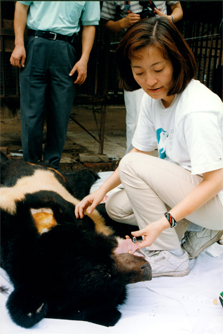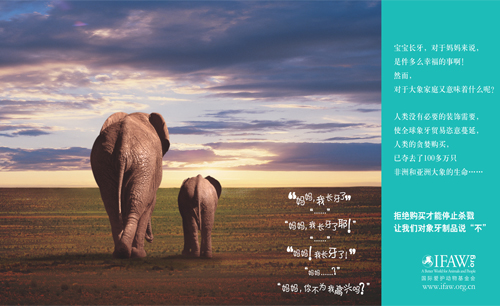To Strive, To Campaign, To Ban, and Not To Yield
Meet the Conservationist: Grace Ge Gabriel
Grace Ge Gabriel is the Regional Director – Asia, of the International Fund for Animal Welfare (IFAW) and was named a wildlife hero among 40 leading conservationists in the world in 2012. A compassion for animals was instilled in her at a tender age when she was raised by forward-thinking parents in China. Grace cut her teeth against wildlife trade and consumption fairly early when she wrote moving dispatches about the cruelties of bear bile farms in China as a journalist. One thing led to another and she joined IFAW and has made a full-time career out of fighting wildlife trade and bush meat consumption. For her abiding grace, candor and relentless campaigns against wildlife trade, ACT names Grace the conservationist of the month. – Ed. Pai
 |
|
A defining moment. Photo credit: Grace Ge Gabriel/IFAW. |
Pai – When, where and how did you start campaigning against wildlife trade?
Grace – I was born and raised in China. After college, I went to the U.S. in 1986 for a Master’s in Communications, and started doing undercover investigations of wildlife markets for NGOs in 1993. Four years later, I returned to China to establish IFAW’s office.
Pai – Tell us about your initial work as a journalist? What made you swap horses and join IFAW?
Grace – Even as I worked as a television journalist, I was outraged with people consuming body parts of endangered species. In 1996, I was filming the opening of the bear farm sanctuary IFAW established in southern China, where bears rescued from a lifetime of confinement in iron cages with no room even to turn around, were released into the lush green grass and bush. One poor animal could not put its paws on the soil because he had forgotten the feel of soil and grass after living on concrete for decades. The moment this bear took his first step to freedom was also a defining moment in my life. I decided to also change my career from an observer to an advocate for animals.
Pai – Why is China blamed as the be all and end all of wildlife trade?
Grace – China’s modern avatar belies its hoary past that embraced sustainability of life forms. Famine, wars and political upheavals have left the Chinese people bereft of empathy with animals and even kinship among themselves. During Chairman Mao’s rule up until the mid-70s, China willy-nilly entered a philosophical and religious vacuum. The only ideology was to get rich anyways one could and things took a turn for the worst for wildlife which was construed to belong to the State. As long it was not private property, wildlife was fair game for all. There was rampant poaching and hunting in the mid-80s and the trend of wildlife farming came into vogue with mushrooming bear and tiger farms across China. Even the country’s wildlife laws are skewed towards utilization of animals for commerce.
Pai – Do you believe wildlife trade in Africa is now supplying the demand in Asia? What is the evidence if this assumption is true?
Grace – Unfortunately yes. CITES approved ivory one-off release to Japan and China in 2008 turned China’s trickle of ivory demand into a flood, pushing up ivory price and stimulating market demand. In 2011, we visited 158 outlets engaged in ivory trade across China and found 101 of them operating illegally. Among the 57 government approved outlets, 60% of them used their legal outlets to launder illegal ivory from poached elephants. Parallel legal and illegal ivory markets made law enforcement difficult and confuse consumers, many of whom take market availability of ivory for the legality of the trade. In China, a consumer survey we did in 2007 reveal that 70% of respondents did not know that ivory came from dead elephants. In Chinese ivory is “Xiang ya,” meaning elephant teeth. An overwhelming 83% also said that if they know elephants had to die to harvest ivory they would not consume ivory.
Pai – We keep hearing that Traditional Chinese Medicine (TCM) is the single biggest guzzler of wildlife products. Is this for real or a myth?
Grace – It is real but a paradox. I am a believer in the quintessential TCM that originated as preventive medicine in ancient China. The original TCM pharmacopeia comprised of 97% plant and mineral ingredients and 3% animal ingredients. When rendered topsy-turvy by traders to trap gullible public it is a commentary on the social mores and not the fault of the medical system. The Chinese people tend to think if the bone structure of the tiger makes it strong, stealthy and sublime, a piece of that bone would be a good cure for one’s arthritis. Exploiting the consumer ignorance and diehard belief, wildlife farming businesses grew exponentially. Under the disguise of “conservation” and “promoting health”, large scale tiger farms speed-breed tigers solely for the trade of their parts and products. I reckon there might be close to 8,000 hybridized tigers, ligers bred in at least 6 farms in China. It is pathetic to view such tame animals in overcrowded enclosures with no genetic potential whatsoever and not a chance to go back into the wild. I have walked with my hair standing on end over cellars holding 400 tiger carcasses soaked in wine. Trading tiger parts from captive tigers further stimulate demand; confuse consumers and fuels poaching of wild tigers.
Pai – Have you faced a threat or feared retribution from anyone because of your life’s work?
Grace – For sure. I have been sued by tiger farms in China. I am a thorn in the flesh of the wildlife trade lobby at the CITES conferences. But I fear no one because my cause is just and it is conservation.
Pai – How can we usher in a change to stanch the flow of wildlife products into China?
Grace – The way to change China is within China. Much as bureaucrats in China would collude with the wildlife trade industry to allow exploitation of animals thrive, the lay public would eschew trade in wildlife products if such an appeal is made to them. This is the core of my work at IFAW and our campaign is beginning to show results.
Pai – What do you consider your finest moment in the fight against wildlife trade and consumption?
Grace - Our “Ma I have teeth” campaign is one such (see picture). In it we depicted an elephant calf unbeknownst telling her mother about its new teeth. Yet, the elephant mother knew her baby having teeth means killing and death to their families. The poster struck a chord with millions, especially youngsters who took to the social media to express their outrage against elephant killings for ivory.
In December 2011, we got wind of an auction in a hotel near IFAW China Office and its inventory included 400 bottles of tiger wine, ivory carvings and rhino carvings. We reported the auction to the authorities and had it banned with an administrative order. In 2012, mainland China’s auction volume decreased by 40% and a study showed ivory sales in auction decreased by 90%, triggering the drop in ivory price in China. These policy developments give me renewed hope and confidence that clear laws banning ivory trade and reducing market supply can help reduce consumer demand.
 |
|
The “Ma, I have teeth” campaign. Photo credit: Grace Ge Gabriel/IFAW. |
Pai – Tell us about your association with peers in Africa
Grace –IFAW’s behavior change campaign in China advocating policy to shut down ivory markets, and raise consumer awareness about the elephant poaching crisis have received support from conservation organizations in Africa. With funding from Elephant Crisis Fund administered by Save the Elephants, IFAW was able to implement a key component of the campaign to mobilize society to stigmatize ivory trade.
Pai – What were the outcomes of CITES 2016 for African elephants?
Grace – African elephants got some reprieve as CITES Parties rejected the proposals to allow more trade in ivory and adopted resolutions calling countries to close their domestic ivory markets and conduct demand reduction campaigns. However, a proposal from a dozen African elephant range states to put all elephant populations back on Appendix I, in a bid to reduce poaching risks to elephants from ivory trade, was not approved. So, elephants across their range states continue to be exposed to criminal syndicates reaping huge profits from killing elephants just for their tusks.